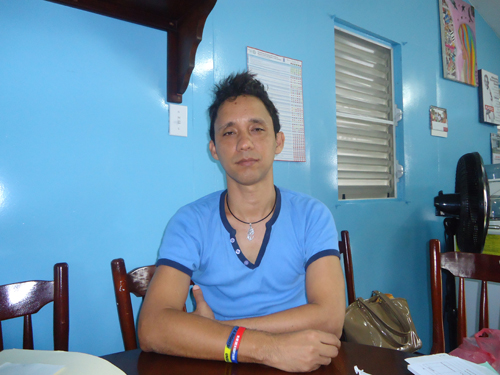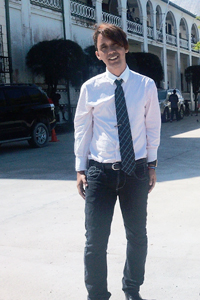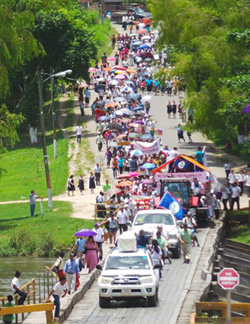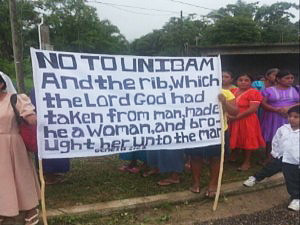Posted by Lucile Scott on September 6, 2013
Caleb Orozco, executive director of United Belize Advocacy Movement (UNIBAM), a GMT Initiative grantee, is the sole plaintiff in a case to overturn the law in Belize that criminalizes same-sex sexual activity, known as Section 53. In May, as oral arguments began in Caleb Orozco v. The Attorney General of Belize, anti-gay rights protesters swarmed streets in cities across Belize. They were organized by the religious group Belize Action, which is led by a Texan evangelical missionary named Scott Stirm. After the arguments ended, the thousands of protesters began targeting a recent amendment to Belize’s Gender Policy that, for the first time, urged all levels of government and civil society to stop discrimination based on sexual orientation. There have been multiple threats against Caleb’s life, and he has been assaulted in the streets. The judge has yet to rule, but regardless of his decision, one side will likely appeal to the Caribbean Court of Justice, a regional court, and that decision could affect laws criminalizing homosexuality in multiple countries in the region. amfAR talked to Caleb about the events and the following is excerpted from that interview.

Caleb Orozco is the sole plaintiff in a case to strike down Belize’s law criminalizing homosexuality.
amfAR: What motivated you to file the lawsuit?
Caleb: Years and years of insults and threats. I realized that by staying silent, I actually perpetuated all those insults and threats. I met with the University of the West Indies Rights Advocacy Project (URAP) and they told me they were doing an analysis of the Caribbean region to find the best place to file litigation to challenge the national laws against homosexuality, and they found that Belize was the most ideal. amfAR supported that research. And I basically said to them, “So why don’t I become the claimant—I was ready yesterday.” We filed the case in September of 2010.
amfAR: The Gender Policy change happened in March, just before your oral arguments. Was it related to your suit at all?
 Orozco in front of the Belize Supreme Court.Caleb: The change to the Gender Policy came as a result of our research about men who have sex with men that we did for the litigation process. We submitted the research to a consultant who was developing the analysis of the Gender Policy, who’s an ally. And that translated into the specific reference to sexual orientation in the updated policy.
Orozco in front of the Belize Supreme Court.Caleb: The change to the Gender Policy came as a result of our research about men who have sex with men that we did for the litigation process. We submitted the research to a consultant who was developing the analysis of the Gender Policy, who’s an ally. And that translated into the specific reference to sexual orientation in the updated policy.
amfAR: What will the lawsuit and actually striking Section 53 off the books accomplish that this doesn’t?
Caleb: One, it would stop the intimidation tactics that police use against MSM. Two, it removes the thinking that we don’t deserve any social protection. Three, it removes the state justification for not including us in new legislation and for not acting on LGBT citizens’ needs. It also removes barriers to targeting MSM in HIV interventions and the National HIV Plan. Also, Section 53 promotes a feeling in MSM that they should be silent about any discrimination they experience.
amfAR: Why was Belize found to be the best place in the Caribbean to file this suit?
 Protesters against the new Gender Policy take over a street in San Ignacio, BelizeCaleb: It’s a ‘live and let live’ culture. People had prejudice, but it wasn’t violent. But actually, since we filed in 2010, the Evangelical group Belize Action has been fanning the flames of prejudice, and they have whipped up permission to hate in such a way that you never know whether going shopping to buy soap and rice is going to be a difficult situation. They say the idea of LGBT rights and the suit to overturn Section 53 come from the U.S. and are “a new kind of imperialism,” but we just did a report with the Southern Poverty Law Center showing that fundamentalist groups from the U.S. are working here to push their agenda and that actually the evangelization of the law is a form of colonialism.
Protesters against the new Gender Policy take over a street in San Ignacio, BelizeCaleb: It’s a ‘live and let live’ culture. People had prejudice, but it wasn’t violent. But actually, since we filed in 2010, the Evangelical group Belize Action has been fanning the flames of prejudice, and they have whipped up permission to hate in such a way that you never know whether going shopping to buy soap and rice is going to be a difficult situation. They say the idea of LGBT rights and the suit to overturn Section 53 come from the U.S. and are “a new kind of imperialism,” but we just did a report with the Southern Poverty Law Center showing that fundamentalist groups from the U.S. are working here to push their agenda and that actually the evangelization of the law is a form of colonialism.
And now the evangelicals—with the help of U.S. right wing persons like Scott Stirm—have organized people to march with signs against us and to hang dummies labeled UNIBAM off trees in effigy. People are now calling gay men UNIBAM instead of faggot. Two people jumped over my gate and damaged my car. And some other people seem to think I belong in the intensive care unit.
But if we win it will show the rest of the region that it is possible. Places like Dominica are considering the litigation approach, but they’re waiting for the decision in Belize. And so we owe it to them. It will give a message that churches have to deal with us. And that fundamental rights and freedom matter.

Young anti-gay rights protesters hold a sign again UNIBAM.